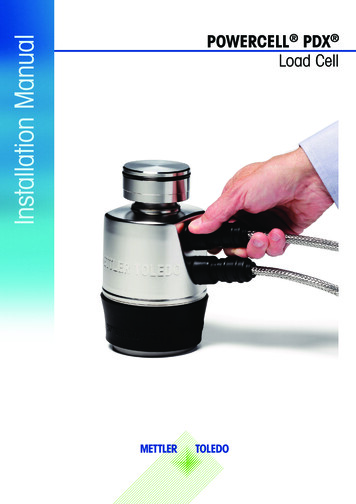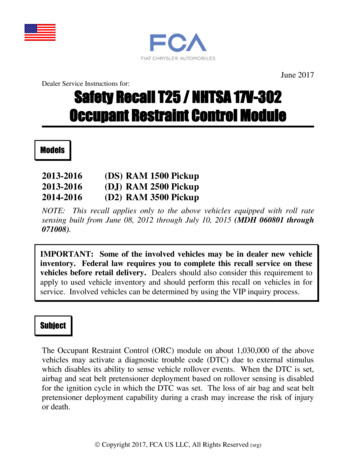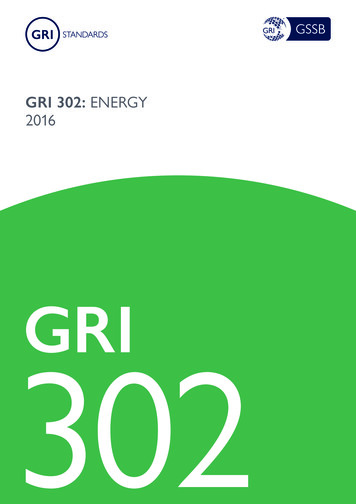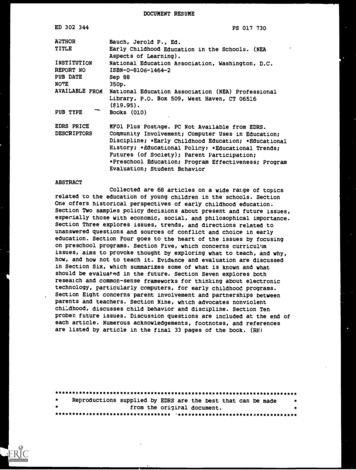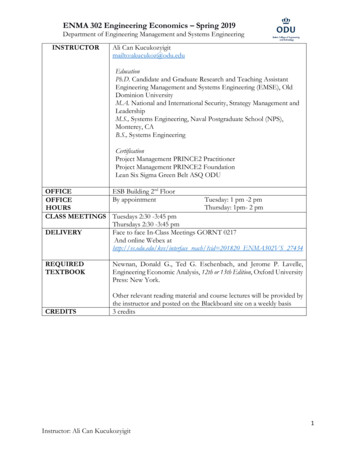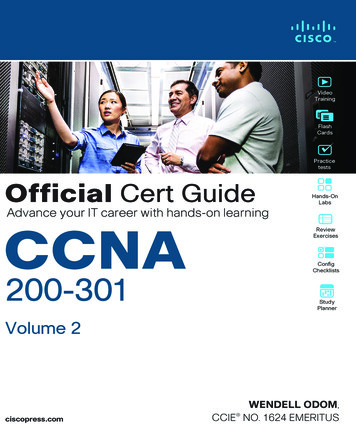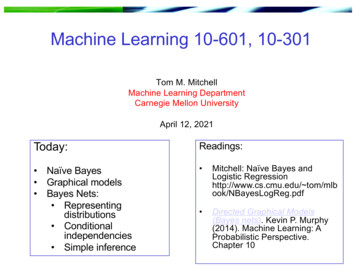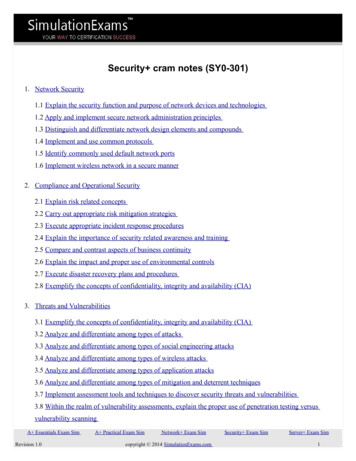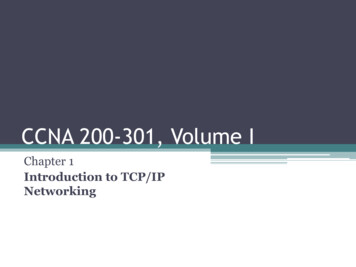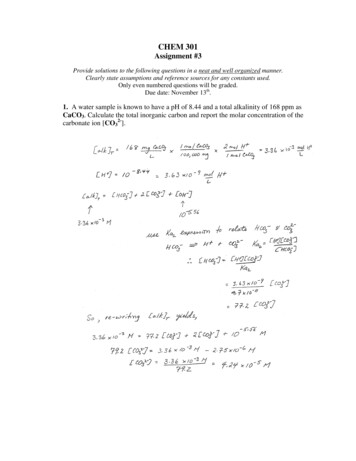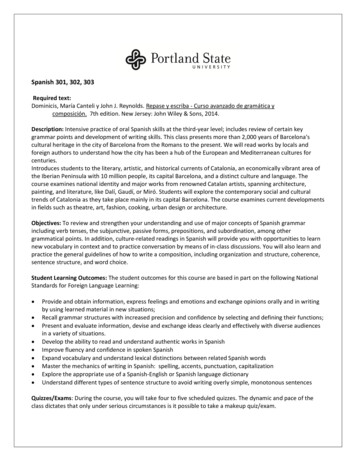
Transcription
Spanish 301, 302, 303Required text:Dominicis, María Canteli y John J. Reynolds. Repase y escriba - Curso avanzado de gramática ycomposición. 7th edition. New Jersey: John Wiley & Sons, 2014.Description: Intensive practice of oral Spanish skills at the third-year level; includes review of certain keygrammar points and development of writing skills. This class presents more than 2,000 years of Barcelona'scultural heritage in the city of Barcelona from the Romans to the present. We will read works by locals andforeign authors to understand how the city has been a hub of the European and Mediterranean cultures forcenturies.Introduces students to the literary, artistic, and historical currents of Catalonia, an economically vibrant area ofthe Iberian Peninsula with 10 million people, its capital Barcelona, and a distinct culture and language. Thecourse examines national identity and major works from renowned Catalan artists, spanning architecture,painting, and literature, like Dalí, Gaudí, or Miró. Students will explore the contemporary social and culturaltrends of Catalonia as they take place mainly in its capital Barcelona. The course examines current developmentsin fields such as theatre, art, fashion, cooking, urban design or architecture.Objectives: To review and strengthen your understanding and use of major concepts of Spanish grammarincluding verb tenses, the subjunctive, passive forms, prepositions, and subordination, among othergrammatical points. In addition, culture-related readings in Spanish will provide you with opportunities to learnnew vocabulary in context and to practice conversation by means of in-class discussions. You will also learn andpractice the general guidelines of how to write a composition, including organization and structure, coherence,sentence structure, and word choice.Student Learning Outcomes: The student outcomes for this course are based in part on the following NationalStandards for Foreign Language Learning: Provide and obtain information, express feelings and emotions and exchange opinions orally and in writingby using learned material in new situations;Recall grammar structures with increased precision and confidence by selecting and defining their functions;Present and evaluate information, devise and exchange ideas clearly and effectively with diverse audiencesin a variety of situations.Develop the ability to read and understand authentic works in SpanishImprove fluency and confidence in spoken SpanishExpand vocabulary and understand lexical distinctions between related Spanish wordsMaster the mechanics of writing in Spanish: spelling, accents, punctuation, capitalizationExplore the appropriate use of a Spanish-English or Spanish language dictionaryUnderstand different types of sentence structure to avoid writing overly simple, monotonous sentencesQuizzes/Exams: During the course, you will take four to five scheduled quizzes. The dynamic and pace of theclass dictates that only under serious circumstances is it possible to take a makeup quiz/exam.
D2L: There is a D2L site for this course. Important course information and other documents will be uploaded toD2L throughout the trimester. Your grades will also be maintained regularly in D2L. The link for D2L is found inthe MyPSU tabs.Book exercises: Each section in the textbook includes several grammar exercises (“APLICACIÓN”) that must bedone in some cases as preparation and in some as homework after the material is presented in class.Completion of these exercises means that students do the following: study or review the theory and theexamples in the book before doing the exercises; complete the exercises consulting the textbook if needed; andself correct their work in class. Students have to come to class with all daily homework ready every day. Theinstructor may collect or review the daily homework sporadically. It is also the student’s responsibility to askquestions and search clarification on any issues that may arise as the student studies and prepares for class ingeneral, and on any problems that may arise with these exercises in particular. Failure to complete thehomework will negatively affect the grade for the course.Readings: Each chapter covered in the book includes a reading, but the instructor may assign other readings.Students have to do all readings before coming to class. Each student must ensure basic comprehension of thereading. The instructor might assign in class brief written exercises about the readings. The readings will bediscussed in class to explore their cultural and literary values, and to enhance students’ analytical skills and theunderstanding of the nuances of Spanish.Daily preparation: Before class, carefully read and study the sections of the textbook indicated by yourinstructor and complete assignments in the textbook as noted. Become familiar with the exercises to bereviewed/corrected in class and make a list of questions you would like addressed in class (or during officehours). Following the class, you should continue to reinforce the material that was covered. This course carries aheavy at-home workload, so it is important to keep up with the assignments. You will receive maximum benefitfrom the assignments if you complete them according to the dates listed on D2L rather than leaving them untilthe day before a quiz. Most assigned exercises from the textbook will be reviewed in class; some will becollected. These exercises should be written on a separate sheet of paper, not in your textbook. Indicate thepage number for each exercise clearly and bring the assignments to class with you each day. While you areencouraged to type homework assignments, handwritten homework may be submitted provided that it islegible. No late assignments will be accepted unless you provide the instructor with official writtendocumentation. This means that if you do not attend class, you may not leave assignments in your instructor’smailbox or send them with a friend and expect to receive credit for the work.Attendance: Given the nature of language learning, attendance is required for this course. You are expected toarrive on time and to have read and prepared the material on the syllabus so that you will be fully prepared foreach class and can participate actively.Grade scale:AAA-97-10094-9690-93B BB-87-8984-8680-83C CC-77-7974-7670-73D DD-67-6964-6660-632
Final grade:25%Quizzes, homework, short essays30%Pebble Pad20%Midterm exam25%Final examFinal Exam:Please review the schedule of classes to be sure that you can attend the final exam. Family travel (e.g. weddings,vacations, etc.) and educational travel (even to Spanish-speaking countries) are not approved reasons formissing exams.Academic Integrity:The following constitutes conduct proscribed by Portland State University for which a student or studentorganization or group is subject to disciplinary action: All forms of academic dishonesty, cheating, and fraud,including but not limited to: (a) plagiarism, (b) the buying and selling of course assignments and research papers,(c) performing academic assignments (including tests and examinations) for other persons, (d) unauthorizeddisclosure and receipt of academic information and (e) falsification of research data.Academic Misconduct:Academic Misconduct is defined as, “actual or attempted, fraud, deceit, or unauthorized use of materialsprohibited or inappropriate in the context of the academic assignment. Unless otherwise specified by the facultymember, all submissions, whether in draft or final form, must either be the Student’s own work, or must clearlyacknowledge the source(s). Academic Misconduct includes, but is not limited to: (a) cheating, (b) fraud, (c)plagiarism, such as word for word copying, using borrowed words or phrases from original text into newpatterns without attribution, or paraphrasing another writer’s ideas; (d) the buying or selling of all or anyportion of course assignments and research papers; (e) performing academic assignments (including tests andexaminations) in another person’s stead; (f) unauthorized disclosure or receipt of academic information; (g)falsification of research data (h) unauthorized collaboration; (i) using the same paper or data for severalassignments or courses without proper documentation; (j) unauthorized alteration of student records; and (k)academic sabotage, including destroying or obstructing another student’s work”.Accommodation statement:Students needing accommodation should inform the instructor as soon as possible. In order receiveaccommodations; the student must register with the Disabilities Resource Center (DRC). The DRC willrecommend appropriate accommodation(s) to your teacher. If you have questions about accommodations butaren't sure if you should have them, please ask the DRC. They are here to help all students. The DRC is located inSmith Memorial Student Union (SMSU), room 435. Telephone: (503) 725-4150 or (800) 547-8887Diversity and Inclusion statement:In this class, we will honor, respect, embrace and value the unique contributions and perspectives of allstudents. Diversity includes age, culture, disability, gender, gender identity, national origin, military background,marital status, social class, color, race, religion, sexual orientation, and diversity of thought. Your suggestions areencouraged and appreciated. Please let me know ways to improve the effectiveness of the course for youpersonally or for other students or student groups. In addition, if any of our class meetings conflict with yourreligious events, please let me know so that we can make arrangements for you.3
Title IX Reporting ObligationsAs an instructor, one of my responsibilities is to help create a safe learning environment for my students and forthe campus as a whole. Please be aware that as a faculty member, I have the responsibility to report anyinstances of sexual harassment, sexual violence and/or other forms of prohibited discrimination. If you wouldrather share information about sexual harassment, sexual violence or discrimination to a confidential employeewho does not have this reporting responsibility, you can find a list of those individuals. For more informationabout Title IX please complete the required student module Creating a Safe Campus in your D2L.4
PORTLAND STATE UNIVERSITY - Spanish LanguageJUNE 25 - JULY 27 RSDAY27-JuneFRIDAY28-JuneCLASS BEGINS(9:00am-2:00pm)CLASS(9:00am-2:00pm)Tutoring session(4:00-6:00pm)SATURDAY/SUNDAY29-June / 30-JuneORIENTATIONFACULTY ARRIVALGreetings at the airport and move tohomestaysInformation on health and safety andother useful information(10:00am-11:00am)Walking Tour(11:00am-12:30)Welcome Lunch -2:00pm)CLASS(9:00am-2:00pm)Coffee meeting with S(9:00am-2:00pm)Tutoring session(4:00-6:00pm)NO -2:00pm)CLASS(9:00am-2:00pm)Coffee meeting with t to PALAU DE LA MÚSICACATALANACLASS(9:00am-2:00pm)Tutoring July17-July18-July19-JulyNO CLASSCLASS(9:00am-2:00pm)Coffee meeting with t to LA SAGRADAFAMILIACLASS(9:00am-2:00pm)Tutoring (9:00am-2:00pm)Coffee meeting with S(9:00am-2:00pm)Tutoring session(4:00-6:00pm)CLASS(9:00am-2:00pm)FAREWELL DINNER(8:00pm)ARRIVAL6-July / 7-July13-July / 14-July20-July / 21-July27-July / 28 July
Dominicis, María Canteli y John J. Reynolds. Repase y escriba - Curso avanzado de gramática y composición. 7th edition. New Jersey: John Wiley & Sons, 2014. Description: Intensive practice of oral Spanish skills at the third-year level; includes review of certain key grammar points and development of writing skills. This class presents more than 2,000 years of Barcelona's cultural heritage .

